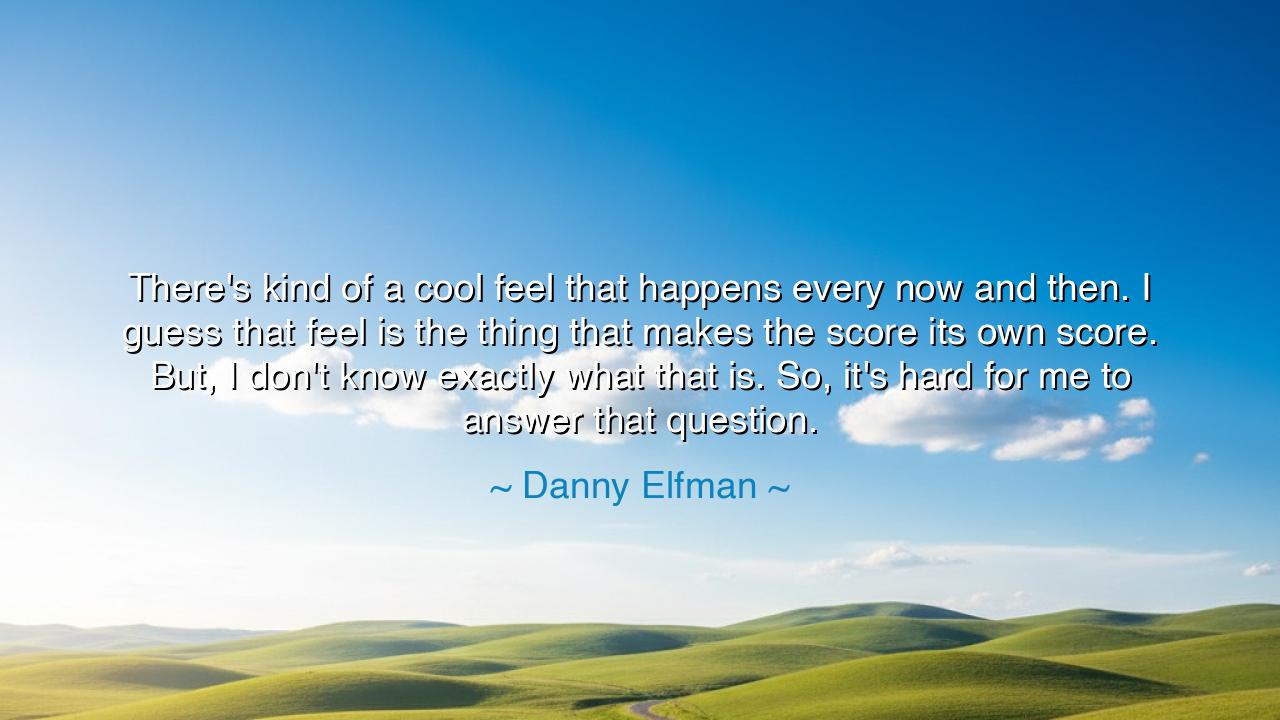
There's kind of a cool feel that happens every now and then. I
There's kind of a cool feel that happens every now and then. I guess that feel is the thing that makes the score its own score. But, I don't know exactly what that is. So, it's hard for me to answer that question.






In the words of Danny Elfman, we are invited to explore the elusive nature of creativity—that intangible force that sometimes descends upon an artist, making their work unique and deeply resonant. Elfman reflects on the mysterious quality of a score, that "cool feel" that happens every so often, which defines a work as its own. This feel, though difficult to define or explain, becomes the essence of the score, the heartbeat that gives it its identity and soul. As Elfman confesses, the very nature of this creative spark is difficult to articulate, for it often emerges from the subconscious, from an instinctive knowing that cannot always be explained. It is in these moments of creation that the artist experiences a connection with something greater than themselves, something that transcends technical mastery and emerges as pure expression.
This search for the elusive quality of art is as old as creation itself. The ancient Greek philosophers spoke of inspiration as a divine gift from the muses—a force that descended upon the artist and filled them with the ability to create beauty. Plato, in his dialogues, referred to the artist as a vessel through which the divine speaks, suggesting that the true essence of art is not the result of rational thought but of an inspiration that comes from beyond the individual. This idea of being “possessed” by creativity is echoed in Elfman’s words. Just as Plato spoke of art as being touched by the divine, Elfman’s description of the score’s "feel" points to something beyond the logical or the structured. It is an instinctive response, something the artist feels rather than understands.
Consider the example of the Renaissance artist Leonardo da Vinci, whose works, from the Mona Lisa to The Last Supper, seemed to possess an undefinable quality that captivated viewers for centuries. Leonardo was a man of profound intellect and scientific curiosity, yet his artistic genius came from something deeper—an intuitive understanding of the human spirit, a connection to something beyond the mere technical execution of his craft. His ability to blend light and shadow, to capture the emotions of his subjects, to create depth and life in his paintings, was not solely due to his mastery of technique but due to the mystical “feel” that imbued his work. Like Elfman’s music, da Vinci’s art could not be fully explained by logic or reason, for it was more than just paint on a canvas—it was a spiritual expression, a glimpse into the soul.
Similarly, Beethoven, in his compositions, sought to convey emotions that words alone could not capture. His Ninth Symphony, for instance, was a work that transcended conventional form, blending complexity and emotion in a way that had never been done before. The "feel" of Beethoven’s music—the energy that he was able to capture with his notes—became its own entity. The piece was a reflection of his vision, an expression of his internal landscape that resonated with audiences in a way that no one had expected. Beethoven, like Elfman, did not always know exactly how his work would turn out, but through his mastery and his intuition, he created something timeless, something that transcended its own creation.
The lesson here is that in the act of creation, there is both an art of technique and an art of intuition. Just as Elfman struggles to articulate the “feel” that defines a score, so too do artists, musicians, and creators across time grapple with the challenge of capturing the ineffable. The most profound works of art—whether visual, musical, or literary—are often those that seem to transcend the understanding of their creator, emerging from a place deeper than the conscious mind can reach. This is where the magic of creation lies: not in the explicit control we exert over our work but in the surrender to the mystery of the creative process.
In our own lives, we can learn from Elfman’s experience. Whether we are writers, artists, entrepreneurs, or parents, there are moments when our work or actions come together in a way that feels almost divine, when we find ourselves caught in the flow of creativity and purpose. It is in those moments, when the effort of creation feels almost effortless, that we connect with something greater. We may not always understand why something works, but we can trust in the process and embrace the unknown. This is where true creativity is born—not from trying to force perfection, but from allowing ourselves to be guided by the invisible forces of inspiration and intuition.
The practical action here is to trust in the mystery of the creative process. Whether in your work, your art, or your personal endeavors, allow yourself to surrender to the flow of creativity, even if you do not understand exactly where it is leading. Like Elfman, let your work be guided by the feel, by the intuitive pulse that calls you to create something uniquely your own. In doing so, you will find that the act of creation is not only a journey into the unknown but a path to understanding the deeper truths of who you are and what you are capable of. Allow the mystery to guide you, knowing that true creativity lies not in the need to explain everything, but in the joy of expressing what is within.






AAdministratorAdministrator
Welcome, honored guests. Please leave a comment, we will respond soon